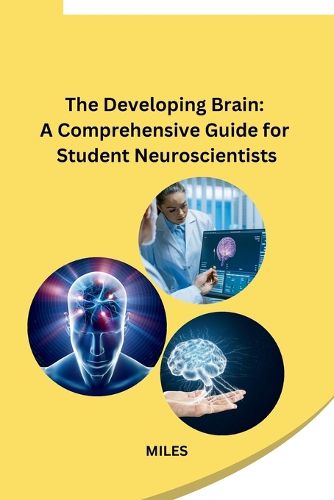Readings Newsletter
Become a Readings Member to make your shopping experience even easier.
Sign in or sign up for free!
You’re not far away from qualifying for FREE standard shipping within Australia
You’ve qualified for FREE standard shipping within Australia
The cart is loading…






This title is printed to order. This book may have been self-published. If so, we cannot guarantee the quality of the content. In the main most books will have gone through the editing process however some may not. We therefore suggest that you be aware of this before ordering this book. If in doubt check either the author or publisher’s details as we are unable to accept any returns unless they are faulty. Please contact us if you have any questions.
Why Study the Developing Brain?The human brain is a remarkable organ that continues to intrigue scientists and researchers across the globe. As students of neuroscience, you might wonder why studying the developing brain is of utmost importance. In this subchapter, we will delve into the significance of understanding the developing brain and how it shapes our understanding of neuroscience.First and foremost, studying the developing brain allows us to unravel the intricate processes that occur during early development. The brain undergoes a multitude of structural and functional changes during this critical period, which significantly impact an individual's lifelong cognitive, emotional, and behavioral patterns. By comprehending the mechanisms underlying brain development, we can gain insights into how the brain forms connections, processes information, and adapts to the environment.Furthermore, studying the developing brain provides a unique opportunity to investigate the origins of neurological disorders and mental health conditions. Many neurological disorders, such as autism spectrum disorders, attention deficit hyperactivity disorder (ADHD), and schizophrenia, manifest during childhood or adolescence. By studying the developing brain, we can identify early markers and potential causes of these disorders, leading to improved diagnostic tools and therapeutic interventions.Additionally, understanding the developing brain is crucial for optimizing educational strategies and interventions. The brain's plasticity during development allows for enhanced learning and skill acquisition. By uncovering the neural mechanisms underlying learning and memory formation in children, we can design effective educational programs that promote optimal brain development and maximize cognitive potential.Moreover, studying the developing brain contributes to our broader understanding of human nature and behavior. Many of the fundamental aspects of human cognition, such as language acquisition, social interaction, and emotional development, are shaped during early brain development. By studying these processes, we can gain insights into what makes us uniquely human and how our brains have evolved over time.
$9.00 standard shipping within Australia
FREE standard shipping within Australia for orders over $100.00
Express & International shipping calculated at checkout
This title is printed to order. This book may have been self-published. If so, we cannot guarantee the quality of the content. In the main most books will have gone through the editing process however some may not. We therefore suggest that you be aware of this before ordering this book. If in doubt check either the author or publisher’s details as we are unable to accept any returns unless they are faulty. Please contact us if you have any questions.
Why Study the Developing Brain?The human brain is a remarkable organ that continues to intrigue scientists and researchers across the globe. As students of neuroscience, you might wonder why studying the developing brain is of utmost importance. In this subchapter, we will delve into the significance of understanding the developing brain and how it shapes our understanding of neuroscience.First and foremost, studying the developing brain allows us to unravel the intricate processes that occur during early development. The brain undergoes a multitude of structural and functional changes during this critical period, which significantly impact an individual's lifelong cognitive, emotional, and behavioral patterns. By comprehending the mechanisms underlying brain development, we can gain insights into how the brain forms connections, processes information, and adapts to the environment.Furthermore, studying the developing brain provides a unique opportunity to investigate the origins of neurological disorders and mental health conditions. Many neurological disorders, such as autism spectrum disorders, attention deficit hyperactivity disorder (ADHD), and schizophrenia, manifest during childhood or adolescence. By studying the developing brain, we can identify early markers and potential causes of these disorders, leading to improved diagnostic tools and therapeutic interventions.Additionally, understanding the developing brain is crucial for optimizing educational strategies and interventions. The brain's plasticity during development allows for enhanced learning and skill acquisition. By uncovering the neural mechanisms underlying learning and memory formation in children, we can design effective educational programs that promote optimal brain development and maximize cognitive potential.Moreover, studying the developing brain contributes to our broader understanding of human nature and behavior. Many of the fundamental aspects of human cognition, such as language acquisition, social interaction, and emotional development, are shaped during early brain development. By studying these processes, we can gain insights into what makes us uniquely human and how our brains have evolved over time.